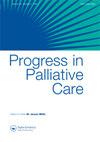通过多学科教育案例会议加强农村居家养老超前护理规划:一项实施-效果混合研究
IF 0.8
Q4 PUBLIC, ENVIRONMENTAL & OCCUPATIONAL HEALTH
引用次数: 4
摘要
加强居家养老的预先护理规划是目前的优先工作。本混合实施-有效性研究旨在实施和评估多学科教育案例会议(MuDECC)在澳大利亚两家农村老年护理机构的临终规划中的有效性。MuDECCs是与居民(如适用)、他们的家人/监护人和多学科医疗保健提供者团队(包括社区药剂师)进行长达一小时的会议,讨论和规划居民未来的临终关怀需求。2018年11月至2019年7月期间,召开了10次多边经济合作会议。使用以利用为中心的方法对实现进行评估。干预结果记录了预先护理计划、预期临终药物的可用性和参与者满意度。在研究期间死亡的23人中,65%的人有书面的临终关怀计划;57%的人服用了预期药物。据报道,mudecc是可接受的、有效的,并且是宝贵的学习经验。通过提供一个知情决策和共同问题分享的框架,MuDECCs有效地促进了预先护理计划和预见性药物的处方。然而,组织mudecc非常耗时,由几个关键人员承担不成比例的责任或时间承诺。在一些农村地区,实施混合经济发展的必要个人和专业资本可能有限或无法获得。本文章由计算机程序翻译,如有差异,请以英文原文为准。
Strengthening advance care planning in rural residential aged care through multidisciplinary educational case conferences: A hybrid implementation-effectiveness study
Strengthening advance care planning in residential aged care is now a priority. This hybrid implementation-effectiveness study aimed to implement and evaluate the effectiveness of multidisciplinary educational case conferences (MuDECC) in end-of-life planning in two Australian rural residential aged care facilities. MuDECCs are hour long meetings with the resident (where appropriate), their family/guardian and a multidisciplinary team of healthcare providers (including community pharmacists) to discuss and plan for the resident’s future end-of-life care needs. Between November 2018 and July 2019 ten MuDECCs were convened. The implementation was evaluated using a utilisation-focused approach. Intervention outcomes were documented advance care plans, availability of anticipatory end-of-life medications, and participant satisfaction. Of 23 persons who died during the study period, 65% had a documented end-of-life care plan; 57% had anticipatory medications charted. MuDECCs were reported to be acceptable, effective, and a valuable learning experience. By providing a framework for informed decision making and joint problem sharing, MuDECCs were effective in facilitating advance care planning and prescribing of anticipatory medications. However, MuDECCs were time consuming to organise with disproportionate responsibilities or time commitments borne by several key individuals. The necessary personal and professional capital to implement MuDECCs may be limited or unavailable in some rural locations.
求助全文
通过发布文献求助,成功后即可免费获取论文全文。
去求助
来源期刊

PROGRESS IN PALLIATIVE CARE
PUBLIC, ENVIRONMENTAL & OCCUPATIONAL HEALTH-
CiteScore
2.60
自引率
11.80%
发文量
24
期刊介绍:
Progress in Palliative Care is a peer reviewed, multidisciplinary journal with an international perspective. It provides a central point of reference for all members of the palliative care community: medical consultants, nurses, hospital support teams, home care teams, hospice directors and administrators, pain centre staff, social workers, chaplains, counsellors, information staff, paramedical staff and self-help groups. The emphasis of the journal is on the rapid exchange of information amongst those working in palliative care. Progress in Palliative Care embraces all aspects of the management of the problems of end-stage disease.
 求助内容:
求助内容: 应助结果提醒方式:
应助结果提醒方式:


